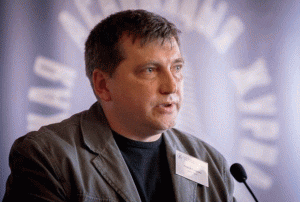Index relies entirely on the support of donors and readers to do its work.
Help us keep amplifying censored voices today.

Andrei Aliaksandrau before his detention
Dear friends
For the four months since the final charge was brought against me, I have hardly received any letters and I don’t know if my letters reach those I continue to write regularly to; more or less stable postal communications remain only with my parents.
But I know and feel your support from rare, undiverted carrier pigeons, regular cute sendings and delicious parcels, for which I am constantly grateful;
I know that many of my friends and colleagues were going to see me at trial in our case that begins on 6 June; but our trial will be closed “for the purpose of not disclosing a secret protected by the law”. What kind of secret this is, I don’t know yet, it is too well protected, and I have stayed in the pre-trial detention centre under investigation for even less than a year and a half; how am I to know?
Perhaps the secret is that the people who will be judged are not guilty of anything; at the very least, I will not plead guilty to what I am accused of.
I am going to the court without unnecessary illusions, but with a clear conscience, and even with excitement.
I will see at last the people dear to me; it is a pity, of course, that I will see them in the dock, but this is now a popular meeting place for good people; and I will be in this place next to good people whose friendship I am proud of.
Irina Levshina is a person with a kind heart and iron principles, a super editor, a pro of the highest level. Dima Novozhilov is exceptionally decent, dutiful, responsive and supportive (another undeniable advantage is that he is a Liverpool fan). And Irina Zlobina is a person with the most unimaginable combination of kindness, intelligence, and beauty in all its forms that I have met in my life.
I’m a happy man. Only a really lucky man could get into such high-class company. Only a really lucky man could get all of you as friends – fellow citizens, colleagues, kind and good people. Thank you for all your warmth, solidarity and support! With them, I feel absolutely calm and steady. It is a pity that I cannot personally congratulate my mother on her birthday, which she will celebrate one of these days. But we will definitely catch up. Life goes on. We go on. History – our history – keeps moving on. Nothing ends.
Let’s write further. Hugs.
Andrei

On Monday Andrei Aliaksandrau (pictured right) and Irina Zlobina, our friends in Belarus, will finally have their day in court, 511 days after they were detained by Lukashenka’s police.
It may, however, be a little misguided to believe that this will be a free and fair trial. There will be no media present. This will be a closed hearing. Their Belarussian lawyers have had to sign a non-disclosure agreement and are prohibited from speaking publicly about the trial. There will be no genuine trial, evidence taken or appeal process.
Andrei and his girlfriend Irina have been charged with treason. Their ‘crime’ was paying the fines of some of the protesters who were arrested after Lukashenka’s sham election. They weren’t even present at the demonstrations. Their potential sentence will be 15 years in a jail cell.
This travesty of justice isn’t occurring in some dim and distant land, but rather only 1,400 miles from where I currently sit.
Andrei and Irina are our friends. Andrei used to work for Index on Censorship – and if all was well, he would now be guiding our work on Ukraine and Russia, ensuring that we were providing a voice for the persecuted. Instead, he is sitting in a jail cell, with 1,214 other political prisoners waiting to learn of his fate. To learn of his partner’s fate. He may be silenced but we are not. So, we have to be his voice.
Today and every day – we are Andrei. We are Irina.
On Monday we will be dedicating our social media to them and their story. Shining a spotlight on the ongoing repressive of Lukashenka’s regime and the effect it is having on our friends, colleagues and those who bravery inspires our work every day.
All we ask of you is a little time and some help – read Andrei and Irina’s testimony on Monday. Read the words of their friends who are scared and share their stories. Because there but for the grace of god go all of us.

Andrei’s beloved Liverpool FC has won two trophies this season and will play UEFA Champions League final at the end of May. Has he been able to follow the Reds? We simply don’t know. Credit: Andrei Aliaksandrau
Belarus journalist and human rights defender Andrei Aliaksandrau marks 500 days behind bars in his native Belarus today. The 44-year-old spent several years working with Index on Censorship, as well as coordinating the Civic Solidarity Platform, a coalition of 60 human rights groups. He is a passionate Liverpool FC supporter. He is not only our former colleague, but also our friend.
Arrested along with his girlfriend Iryna Zlobina, another political prisoner of the brutal regime of Alexander Lukashenko, Andrei faces up to 15 years in prison if convicted. The accusation? “Treason to the State”. He was arrested after paying off fines given to journalists and protesters who took to the streets following the fraudulent 2020 presidential election, “won” by Lukashenko.
It’s hard to imagine how Andrei feels about his freedom being deprived in such a cruel and unfair way. How many major worldwide events since January 2021 has he been prevented from following more closely? The Taliban’s return to power in Afghanistan, the migration crisis on the border between Poland and Belarus and the Russian invasion of Ukraine. Surely Andrei would be taking a stand on these matters and collaborating in some way, but that basic right was ruthlessly taken from his hands.
Has Andrei been able to follow the news surrounding his beloved Liverpool FC? The Reds narrowly missed winning the Premier League in the last round of the 2021-2022 season. “You’ll Never Walk Alone,” was chanted in unison by everyone in the Anfield stadium after the match against Wolverhampton. Given the chance, Andrei would undoubtedly have joined in. On 28 May, Liverpool faces Real Madrid in Paris, in the final of the European Champions League. Most likely, televisions in prison (if there are any) will not show the match, and our friend will not see the emotions of the game. Instead, he will have to follow it with his heart. But in fact, he might not even know that his team is playing such an important match.
Andrei was jailed just as the first Covid-19 vaccinations were becoming available. Has he even had his first jab, let alone the two or three that wider society has been offered? If not, his health is at risk in addition to his liberty.
Currently, there are more than 1,000 political prisoners in Belarus, as far as we know. As the days go by, our duty grows to do everything we can to help Andrei, Iryna and all of the others imprisoned merely for exercising their free expression. We must release them from this nightmare. There is an online petition that everyone can sign to demand Andrei and Iryna’s urgent and unconditional release. You can stand with us by signing your name alongside ours.
The free press in Belarus is under threat like never before in the wake of the disputed re-election of Aleksandr Lukanshenka in August 2020, with journalists being threatened, fined, arrested and tortured for speaking out against the country’s ruler. Indeed, former Index employee and contributor Andrei Aliksandrau remains in prison, facing a sentence of up to 15 years for alleged “high treason”.
A year after the elections, the Belarusian authorities went a step further in clamping down on media freedom, banning the country’s journalism body, the Belarusian Association of Journalists.
Despite the challenges, the BAJ continues to receive support and, at the end of April, the organisation was awarded the 2022 UNESCO/Guillermo Cano World Press Freedom Prize.
Index spoke with BAJ chair Andrei Bastunets in the wake of the award, talking about the worsening situation for independent media and how BAJ continues to support press freedom.
Is it still possible to work as an independent journalist in Belarus following the start of the war in Ukraine?
“The key problems for Belarusian independent journalists arose before the war in Ukraine, and even before the 2020 presidential election. But after the elections – and journalists’ coverage of post-election protests – the pressure on the media, journalists and bloggers has increased dramatically (although earlier Belarus had bad ranking positions in international free speech ratings and indexes too). In 2021, many journalists and even entire editorial offices were forced to flee the country in order to avoid criminal prosecution by the Belarusian authorities and to be able to continue their professional activities.”
“A lot of Belarusian journalists – more than 100 – who were forced to leave their country chose Ukraine as a place of refuge. But after the start of the Kremlin’s war against this country, they had to leave their homes and belongings again and move to other countries. Journalists and bloggers who continue to work in Belarus face additional persecution for expressing their anti-war position. However they spread truthful information on what is happening. Last week, Baranavichy-based journalist Yury Hantsarevich was detained and accused of passing on information about Russian troop transfers in Belarus.”
How many journalists are still in detention in Belarus?

Andrei Bastunets, chairperson of the Belarusian Association of Journalists
“There are 24 journalists behind bars at the moment. Eight of them are serving their terms in prison, and the rest are in custody pending trial. All are deemed political prisoners by Belarusian human rights organisations.”
“In the first four months of 2022, five sentences were handed down against journalists in criminal cases – from 1.3 to 2.5 years in prison. The maximum punishment for a journalist has been a 15-year strict regime sentence for blogger Ihar Losik, who was a consultant for the Belarusian service of Radio Liberty.”
“My friend and former Index staff member Andrei Aliaksandrau has been in jail since January 2021; and recently the Belarusian Investigative Committee reported on the charges against him under four criminal articles, including Article 356 (high treason) which outlines a punishment of up to 15 years in prison.”
How is the war (or special military operation as Putin would have it) being reported in Belarus?
“There is a difference in the approaches of state-run and independent media outlets. In the news agenda of the independent media, the war in Ukraine is being called ‘war’ and it is on their front pages. These media outlets are publishing mostly online now because they do not have an opportunity to publish in print after printing houses and state monopoly distribution chains were banned from cooperation with the independent press. The state television and other government-backed media in Belarus are reporting on the war in Ukraine spreading the narratives of the Russian pro-Kremlin media.”
Is the BAJ still operating and is it having to do so from exile?
“In August 2021, the Supreme Court of Belarus ordered the dissolution of the organisation, at the request of the country’s Ministry of Justice. Now, BAJ is not an organisation registered by the Ministry, it is not a formal structure. It is about 1,300 people united in implementing their common idea and their mission – to expand the space of free speech in Belarus. And an official’s resolution has not affected our activities. Most of the organisation’s leadership had to leave the country after a series of police raids and interrogations by investigators, after arrests of our colleagues and friends, but we continue our work from abroad. We treat all media outlets of Belarus, regardless of whether they stayed in the country or moved abroad, as a single Belarus media sector. And we are providing all the necessary and possible support to this media sector.”
How important is the recognition through awards of BAJ, such as the Unesco award recently?
“We regard the UNESCO award as support for the entire independent journalistic community in Belarus. By the way, within literally two days, BAJ received three awards. In addition to UNESCO/Guillermo Cano World Press Freedom Prize, there was the award from the Swedish section of Reporters Without Borders (RSF) and Difference Day Honorary Title for Freedom of Expression from Brussels ULB and VUB universities. They are very important for our organisation as appreciation of our work, but even more as a high assessment of Belarusian journalists’ work in extremely difficult conditions. And, of course, it is important for us that Belarus has returned to the front pages of the international media. Although, we understand indeed that current events in Ukraine are attracting general attention as the state of affairs in the region and of the entire system of world security formed after WWII depend on their development.”